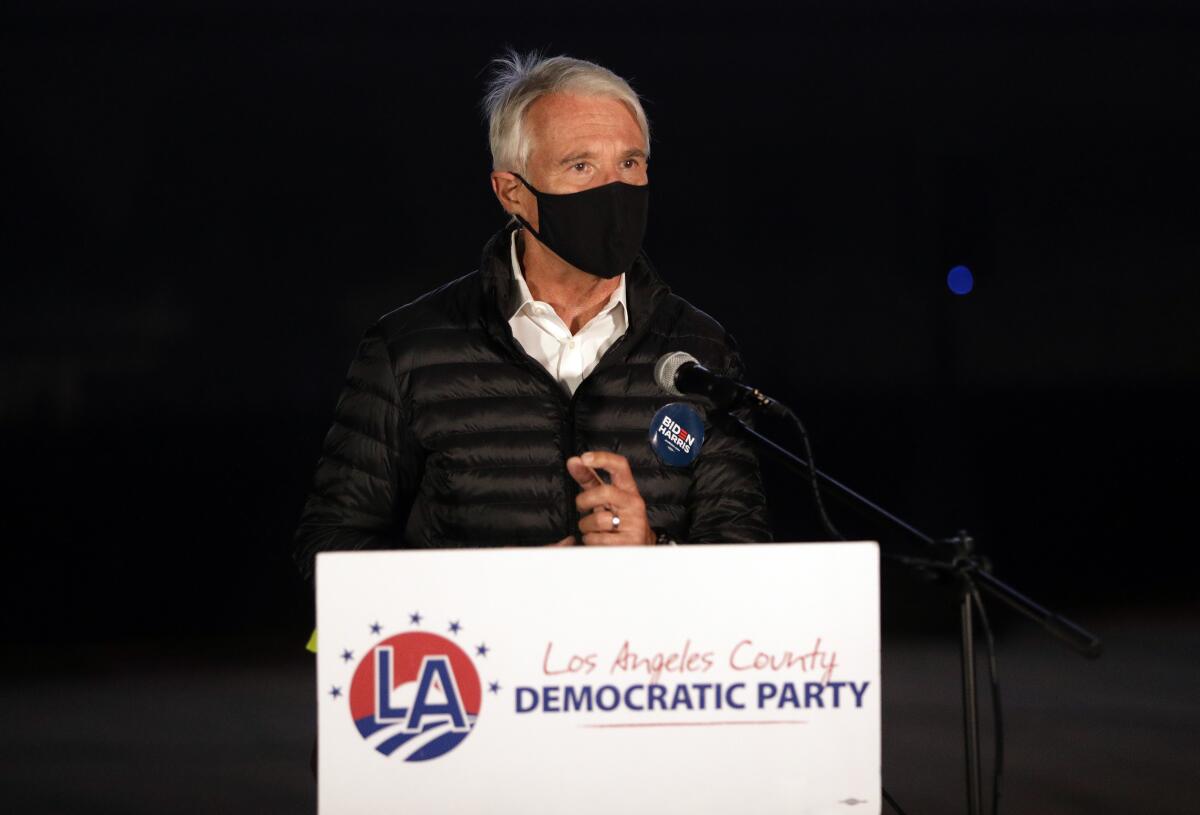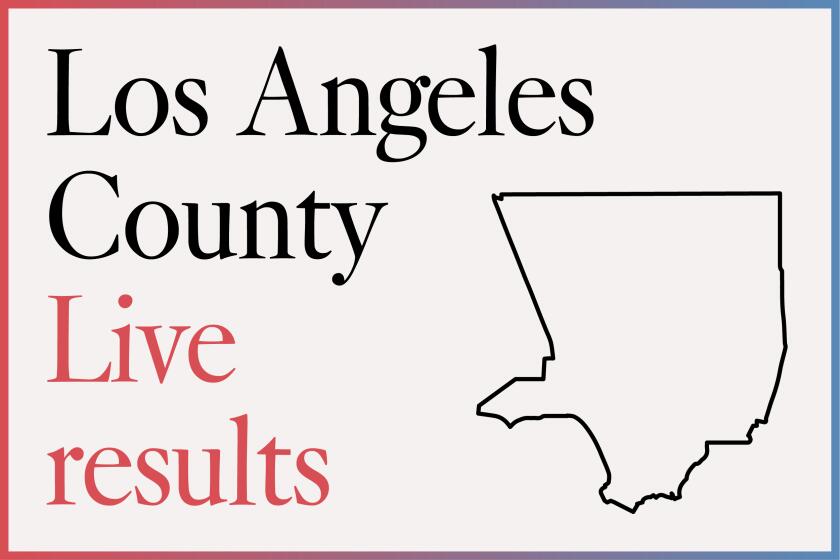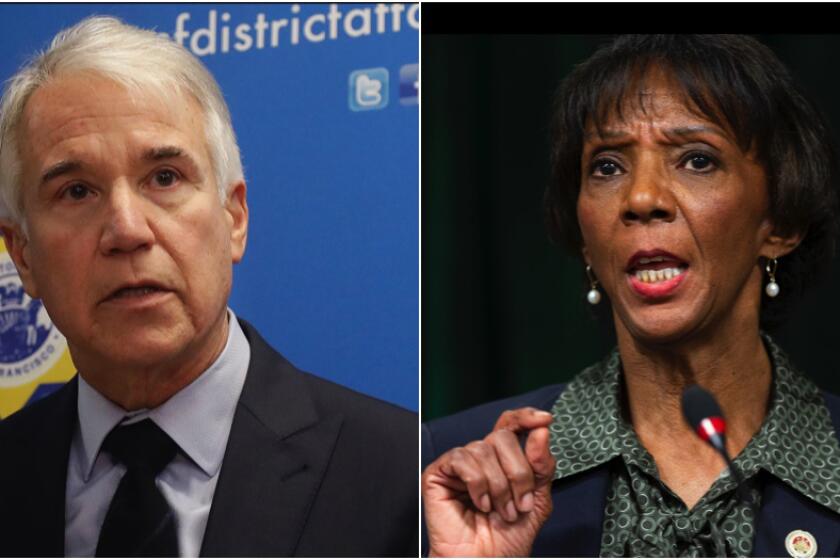George Gascón barely survived his primary. Now, he’s likely to be L.A. County’s district attorney

- Share via
Eight months ago, more than a few people were writing George Gascón’s political epitaph.
Sitting roughly 20 points behind incumbent Los Angeles County Dist. Atty. Jackie Lacey in the March primary for the powerful post, consultants began to question if Gascón had entered the race too late. If he’d failed to broaden his appeal beyond activists. If his campaign had underestimated Lacey’s support in a county where she’d served as the top prosecutor for the better part of a decade.
And even though Gascón split the primary vote with another progressive challenger, former public defender Rachel Rossi, some believed he had underperformed.
But after a summer that saw countless protests calling for criminal justice reform and a number of politicians pull their support from Lacey, Gascón is positioned to take control of the largest district attorney’s office in the nation and deliver an enormous victory to a movement seeking to elect progressive prosecutors across the country.
On Wednesday night, Gascón held 54% of the vote to Lacey’s 46%, leading by about 222,000 ballots. More than 600,000 votes were left to be counted, many of them mail ballots, according to the L.A. County Registrar’s Office. Both campaigns had refrained from declaring victory or conceding, though Lacey’s window to win had narrowed significantly.
Observers and experts said they believe a number of factors changed Gascón’s political fate. A summer of unrest stemming from deadly police shootings worsened Lacey’s standing in a county where her record on that issue was often criticized. And the increased focus on police accountability energized voters and donors around Gascón, giving him a massive fundraising advantage in the general election.
Progressive voters seeking to drive President Trump from the White House may have also weakened Lacey’s chances to claim a third term. Meanwhile, Lacey was likely hurt by her reliance on funding from police unions and an inability to shake the perception that she was resistant to reform efforts in a deep blue county, some said.
“There’s a long record of this tough-on-crime thing, that kind of partnered really nicely with the endorsement and fiscal support of police unions. Police unions and money in L.A., on the left, have become toxic,” said Brian VanRiper, a political consultant who has worked on a number of Los Angeles City Council races.
The financial dynamics of the race certainly tilted in Gascón’s favor after the primary. Both candidates had raked in about $2 million from outside committees in February. By the end of October, Gascón’s outside donations topped $12 million while Lacey’s stood around $7 million, meaning he outraised her nearly 2 to 1 in the general election.
Some have also suggested Gascón’s success was also the culmination of years of organizing against Lacey. Demonstrators affiliated with Black Lives Matter L.A. have marched on Lacey’s office on a weekly basis for years, repeatedly attacking her for failing to hold police accountable in the fatal shootings of Black and Latino men. In one of the most unnerving moments of the contentious race, Lacey’s husband pointed a gun at Black Lives Matter organizer Melina Abdullah and two other demonstrators during a March protest outside their Granada Hills home.
The group’s weekly protest turned into a presumptive celebration Wednesday with familiar chants of “Jackie Lacey Must Go” turning into “Jackie Lacey Will Go.” Hundreds of people stood outside the Hall of Justice as relatives of several people shot and killed by police took the stage, flanked by signs that read “Jackie Lacey Gone.” Lisa Hines, whose daughter, Wakiesha Wilson, died in LAPD custody in 2016, said she was delighted to see Lacey losing but also warned Gascón he would face protesters’ wrath if he didn’t live up to his promises to hold police accountable.
In an interview Tuesday night, Lacey said she regretted that her relationship with activists had become so toxic, and said it was something she hoped to repair if elected to a third-term.
The November contest between Los Angeles County Dist. Atty. Jackie Lacey and former San Francisco Dist. Atty. George Gascón to oversee the nation’s largest prosecutor’s office has been framed as a test of appetites for criminal justice reform.
“I thought I was doing the right thing by saying ‘Look, I will meet with you, but we’re not going to do a town hall where you’re screaming at me, telling me these things.’ I now think that there’s some value in just showing up even if the crowd is angry and yelling at you,” she said. “So, I realize, that when this all started to go down, that I didn’t have those strong community relationships, particularly in the Black community.”
Meanwhile, some Gascón critics noted his lead did not represent a sweeping endorsement of his progressive policies.
“Whoever wins, and right now it’s looking like it’s not going to be her, the bigger takeaway is no one really had a real strong mandate on either side,” said Eric Siddall, vice president of the union representing L.A. County deputy district attorneys. “It’s a relatively close race.”
Others who supported Lacey said Tuesday night’s result was one they had long feared after she failed to end the race in March. A person involved in a pro-Lacey independent expenditure, who requested anonymity to speak about the matter candidly, said some supporters were frustrated that Lacey’s campaign did not treat the March primary as an all-or-nothing proposition, considering the presidential race was likely to drive progressive voter turnout in November.
“The concern after March was you essentially had more than a majority of voters who voted for somebody other than Jackie Lacey,” the person said. “When you start to see how much money was being put in by other groups, millions upon millions of dollars that no one could keep pace with, it’s not a surprise that Gascón won.”
More to Read
Sign up for Essential California
The most important California stories and recommendations in your inbox every morning.
You may occasionally receive promotional content from the Los Angeles Times.














